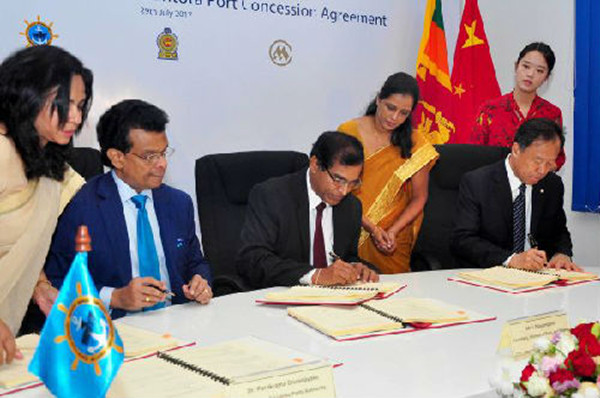Hambantota Port deal opens new era for China-Sri Lanka ties
- By Rabi Sankar Bosu
 0 Comment(s)
0 Comment(s) Print
Print E-mail China.org.cn, August 19, 2017
E-mail China.org.cn, August 19, 2017
|
|
|
A photo taken on July 29, 2017, shows the signing ceremony on lease of Sri Lanka's deep-sea port of Hambantota to China Merchants Port Holdings. [Photo: Xinhua] |
On July 29, Chinese port operator China Merchants Port Holdings (CMPort) and the Sri Lanka Ports Authority (SLPA) signed a 99-year lease agreement in Colombo to develop Hambantota Port in southern Sri Lanka in the presence of Minister of Ports and Shipping Mahinda Samarasinghe and China's Ambassador Yi Xianliang.
CMPort, which also has a similar contract with Colombo Port, will take charge of all commercial and administrative management operations at Hambantota under the $1.5 billion deal, giving it a 70 percent stake, with SLPA holding the remaining 30 percent.
The landmark agreement was finalized on July 25 by the government of Prime Minister Ranil Wickremesinghe, the Sri Lankan cabinet describing it as "a win-win situation for both countries." It was first proposed during the tenure of former president Mahinda Rajapaksa's tenure.
At the signing ceremony, Minister Samarasinghe said: "This is a historic day for us as Sri Lanka and China embark on a new journey to develop Hambantota Port," under which CMPort will invest US$1.12 billion in the port and a nearby Sri Lanka-China Logistics and Industrial Zone.
The agreement will be beneficial for Sri Lanka's 20 million people, injecting new vitality into the strategic cooperative partnership in various fields. It is expected that it will boost Sri Lanka's foreign-exchange reserves by encouraging Chinese investors to establish cement, iron industries and various refineries in and around Hambantota.
Hambantota Port which is 240 kilometers (150 miles) from Colombo, is a deep-water port located on the southern coast of Sri Lanka, and its strategic location offers huge opportunities for the Sri Lankan economy. It will also play a key role in the China-proposed "Belt and Road Initiative" linking ports and roads across Asia, Africa, the Middle East and Europe in trade, economic and cultural cooperation.
However, the port deal was delayed by several months due to protests by locals fearing loss of their land as well as fears of upsetting India, always wary of Chinese domination in the Indian Ocean.
Since 2014, India has raised repeated concerns over the deal, fearing the Chinese-built port would provide a naval advantage on its doorstep. Some Indian media even criticized the project as China's "debt-trap diplomacy" given debt-ridden nature of the Sri Lankan economy.
However, it should be noted that, according to the new deal, the Sri Lankan Navy will be responsible for security of the port, and it will not be allowed to become a base for any foreign navy.
Indeed, China has no intention to offend India, and the Hambantota project is simply good for Sri Lanka's economic development. If India continues to have a problem with the project, it only shows it wants to meddle in Sri Lanka's domestic affairs.
The Chinese presence is important to keep the island nation free from Indian and Western influence. Most Sri Lankans believe China has no ulterior motive in the country or in the region.
In 2009, Sri Lanka, with the strong assistance from the international community, ended a 30-year-long civil war against the Tamil Tigers. During the post-war reconstruction, the Chinese government and people have continued to lend a helping hand to provide a large number of concessional low interest rate loans and investments for Sri Lanka.
This year marks the 60th anniversary of the establishment of diplomatic relations, as well as the 65th anniversary of the signing of the Agreement on Rice for Rubber. The two countries have supported each other consistently on issues concerning their core and significant interests, with substantial benefits to both sides.
The Belt and Road Initiative has opened up a new era for China-Sri Lanka strategic cooperation. Sri Lanka welcomes China's increased participation in its industrialization process, and infrastructure construction in particular.
Sri Lanka needs to make best use of its locational advantage to contribute to "Belt and Road" construction through the Hambantota Port and the Colombo Port City projects, further promoting relations with China.
Rabi Sankar Bosu, secretary of New Horizon Radio Listeners' Club, West Bengal, India
Opinion articles reflect the views of their authors only, not necessarily those of China.org.cn.







Go to Forum >>0 Comment(s)